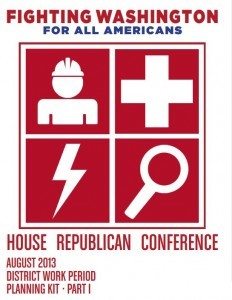Politics & Government
The GOP’s House of Shame

One of the most famous lines not spoken by the man it’s been attributed to is “Have You No Shame?” During the infamous Communist-witch-hunt Hearings of Wisconsin Republican Senator Joseph McCarthy in 1954, attorney Joseph Welch supposedly fired these words at McCarthy. What he actually said, however, is “Have You No Sense of Decency?”
Nevertheless, the first wording, mythical as it is, seems the more appropriate one to ask present-day Republicans, especially in the House of Representatives.
The majority of Americans are not always correct. But their consistently low regard for the present Congress, especially the Republican behavior within it, is dead-on. In a late July 2013 NBC/WSJ poll, only 12 percent approved of the job Congress was doing, while 83 percent disapproved. Another question (and the percentage response indicated afterward) was “Do you think Republicans in Congress are too inflexible in dealing with President Obama (56 percent), are too quick to give in to President Obama (18 percent), or are they striking the right balance in dealing with President Obama?” (19 percent).
In the days after the poll was taken and just before the August Congressional recess, House Republicans once against demonstrated why they so well deserved the contempt of most Americans and why the question “Have You No Shame?” is so appropriate.
In late July, attempting to pursue the deep cuts urged by Republican leaders such as House Budget Committee Chairman Paul Ryan, the Republican majority in the House Appropriations Interior and Environmental subcommittee voted to cut the budget of the U.S. Environmental Protection Agency (EPA) by about a third and the National Endowments for the Arts (NEA) and Humanities (NEH) by almost half. Hostility to the EPA on the part of Republicans, many of whom deny or minimize climate change concerns, is nothing new.
At the beginning of August, House Republican leaders announced that after the recess they would push forward a bill designed to cut food stamps spending by $40 billion over 10 years.
On August 1, journalist Timothy Egan began a New York Times article as follows:
Just now, a cell of several hundred people has been dispatched into the American summer, to picnics, town halls, radio stations, hospitals and Little League playing fields, with a mission to derail the economic recovery and drum up support for sabotaging federal law. They’re not terrorists, nor are they agents of a foreign government. This is your United States Congress, the Republican House, on recess for the next five weeks.
They even have a master plan, a 31-page kit put together by the House Republican Conference, for every member to follow while back home with the folks.
Egan then highlights some of the blatant dishonesty reflected in the plan, including the claim that Republicans are “working to spur economic growth and create more jobs.” His response is “They’re not, of course. Not by any measure. Just the opposite. Their brinkmanship on the budget will probably cost 750,000 jobs this year, and about 900,000 next year, by the estimate of the nonpartisan Congressional Budget Office. In truth, the biggest drag on a recovering economy is this Congress.”
 He goes on to say, “Unable to stop the Affordable Care Act [often labeled Obamacare] by the normal rules of a democracy—e.g., the Supreme Court, or winning a national election—a core group of leading Republicans now plan to sabotage the law. If the president doesn’t agree to halt operating funds for his signature achievement on the eve of its implementation, Republicans may shut down the government, throwing thousands of people out of work and disrupting a huge part of the economy.”
He goes on to say, “Unable to stop the Affordable Care Act [often labeled Obamacare] by the normal rules of a democracy—e.g., the Supreme Court, or winning a national election—a core group of leading Republicans now plan to sabotage the law. If the president doesn’t agree to halt operating funds for his signature achievement on the eve of its implementation, Republicans may shut down the government, throwing thousands of people out of work and disrupting a huge part of the economy.”
The day after Egan’s article, the House passed another useless measure to block a portion of the Affordable Care Act, this time to prohibit the IRS from enforcing or carrying out any portion of the law. Since its 2010 passage, the House has voted about 40 times to prevent all or a portion of it from going into effect. I say “useless” because the House realizes that even if it could get Senate agreement to prohibit IRS involvement, which is unlikely, President Obama’s veto would prevent the House vote from ever achieving its aim.
Before we go further in discussing Republican opposition to the Affordable Care Act a few clarifications are in order.
- It represented, when passed in 2010, a complex compromise between the president and legislators in both houses of Congress—thus, labeling it “Obamacare” simplifies a more complex reality.
- Most of the Act was upheld by the Supreme Court in 2012.
- Most objective observers agree that the pre-2010 U.S. health care system, which left so many Americans uninsured and was far more expensive than that of other developed countries, was deeply flawed.
- During and after passage of the 2010 law, groups like Fox News have spewed forth a tremendous amount of disinformation about it.
- Very few people would argue that the Affordable Care Act was a piece of perfect legislation—most political compromises are not.
- But it has been and can continue to be tweaked in order to improve it.
Because the law is so complex and because of the disinformation put forth about it, many Americans are confused—despite referring to the law as Obamacare, the web site Obamacarefacts presents a reliable and detailed breakdown of it. Take, for example, the recent NBC/WSJ poll mentioned above. It asked, regarding “Obama’s health care plan that was passed by Congress and signed into law by the President in 2010, do you think his plan is a good idea or a bad idea?” Only 34 percent replied, “good,” while 47 percent said “bad.” But when asked whether Republicans should try to prevent the law from going into effect, only 45 percent said “yes,” while 51 percent said “no.”
But back to the Republicans’ shame. What is so shameful about their trying to prevent the president’s aims from being realized if they really believe that his measures are not in the best interest of the country? What is shameful is that the Republican naysayers are not working for the common good, as all Congressional representatives should be.
Even some conservatives and Republicans recognize this. A little over two years ago conservative New York Times columnist David Brooks wrote:
The Republican Party may no longer be a normal party. Over the past few years, it has been infected by a faction that is more of a psychological protest than a practical, governing alternative.
The members of this movement do not accept the logic of compromise, no matter how sweet the terms. . . . If you ask them to raise taxes by an inch to cut government by a yard, they will still say no.
The members of this movement do not accept the legitimacy of scholars and intellectual authorities. A thousand impartial experts may tell them that a default on the debt would have calamitous effects, far worse than raising tax revenues a bit. But the members of this movement refuse to believe it.
The members of this movement have no sense of moral decency. . . .
The members of this movement have no economic theory worthy of the name.
In May 2013, former Republican Senate Majority Leader Bob Dole, who Edelman’s book on poverty credited with being the “most notable Republican advocate” of food stamps, insisted that “the current GOP ought to be ‘closed for repairs’ because it lacks a vision and is unable to strike deals with Democrats.” Two months later a former Republican congressman, Steve LaTourette of Ohio, declared that “The [Republican] leadership in the House is more concerned about gaming the other party so that they can be in charge than they are in actually accomplishing anything.”
LaTourette believes this lack of cooperation is partly due to the gerrymandering of congressional districts that have encouraged politicians to “shovel red meat to their base on the right and left to avoid facing political primary challenges.” He estimates that only about 34 of 435 House seats are competitive enough to be taken by either a Republican or Democrat.
“No sense of decency”; should be “closed for repairs”; not really interested in “actually accomplishing anything,” these are serious charges against the Republican Congressional leadership. Especially coming from conservatives and other Republicans.
I have written frequently on this blog about the Republicans unwillingness to compromise and other failings, but I continue to be appalled over how so many of them in Congress can be so callous to the needs of our country.
One might ask them, “Even if your districts have been redrawn in such a way as to encourage the throwing of ‘red meat’ to your right-wing constituents, don’t you have a higher responsibility to your country, to its common good?” Brooks accused you of not recognizing “the legitimacy of scholars and intellectual authorities.” Don’t you have a duty to recognize such legitimacy and try to raise yourself and your constituents above the level of misinformation disgorged by the likes of Fox News and the Koch brothers?
At a time when strange weather patterns are creating more havoc than ever and the EPA needs to be strengthened and not weakened, how can you continue to deny or ignore the findings of the vast majority of the world’s climate specialists and advocate drastic cuts in EPA funding? At a time when U. S. income disparity between the rich and the poor has reached scandalous proportions—in 2010, the wealth of the heirs of the Wal-Mart empire exceeded that of bottom 40 percent of all American families combined (see here for source)—how can you continue to resist raising taxes on the rich while planning to cut food stamps for the poor?
Food stamps have been one of our most successful programs in the fight against poverty according to Peter Edelman in his excellent book So Rich, So Poor: Why It’s So Hard to End Poverty in America (see here for a review). David Brooks charges you with having “no economic theory worthy of the name,” yet you are going to reduce help to the poor. Why?
There have been other House Republican failures to advance the common good—e.g., in regard to gun control and preventing the sequester from going into effect on March 1, 2013. Everything considered, is it any wonder that “Have you no shame?” keeps coming to mind.
(Walter G. Moss is a professor emeritus of history at Eastern Michigan University. His most recent book is An Age of Progress? Clashing Twentieth-Century Global Forces. His post first appeared on LA Progressive and is republished with permission.)

-

 Latest NewsDecember 8, 2025
Latest NewsDecember 8, 2025This L.A. Museum Is Standing Up to Trump’s Whitewashing, Vowing to ‘Scrub Nothing’
-

 Striking BackDecember 4, 2025
Striking BackDecember 4, 2025Home Care Workers Are Losing Minimum Wage Protections — and Fighting Back
-

 Dirty MoneyDecember 3, 2025
Dirty MoneyDecember 3, 2025Trump’s Anti-Climate Policies Are Driving Up Insurance Costs for Homeowners, Say Experts
-

 Child FarmworkersDecember 5, 2025
Child FarmworkersDecember 5, 2025To Protect Underage Farmworkers, California Expands Oversight of Field Conditions
-

 Column - State of InequalityDecember 4, 2025
Column - State of InequalityDecember 4, 2025Can California Claw Back Some Medi-Cal Care?
-

 Latest NewsDecember 10, 2025
Latest NewsDecember 10, 2025Capital & Main, L.A. Times Win Sidney Award for Reporting on Child Farmworkers
-

 StrandedDecember 9, 2025
StrandedDecember 9, 2025Giving Up on the Dream: Asylum Seekers Try Other Options in Mexico
-

 Locked OutDecember 16, 2025
Locked OutDecember 16, 2025This Big L.A. Landlord Turned Away People Seeking Section 8 Housing

